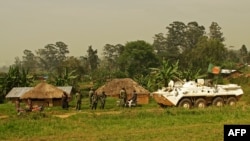The U.N. refugee agency says the recent outbreak of ethnic violence in Ituri province, in northeastern Democratic Republic of Congo, could presage a mass exodus of refugees and internal displacement.
The UNHCR says violent clashes between the Hema and Lendu ethnic groups in Ituri province have killed at least 30 people and caused more than 5,000 to flee their homes.
UNHCR spokesman Baba Balloch told VOA the conflict, which erupted five days ago, is not new to this region. He says growing tensions over land and grazing rights between the two groups has led to this latest flare-up.
“This is a return of violence after almost two decades when in the late 1990s around 400,000 people were displaced because of the tensions between the two groups,” Balloch said.
Tens of thousands of people were killed between 1999 and 2003. Since then, a low-level conflict has existed in Ituri, broken by occasional flare-ups.
UNHCR monitors in the region say many villages in Ituri’s Djugu territory have been burned to the ground. Balloch said thousands of people have become internally displaced. And, he said nearly 1,400 refugees fled to Uganda in search of refuge earlier this week.
“Now, UNHCR offices on both sides of the border are once more on high alert. We fear the fighting could spread to the neighboring areas, particularly because of the circulation of light weapons in the region,” he said.
Balloch said a majority of the refugees and internally displaced are women and children. He added that access to some of the communities is limited. He said this is very worrying as aid workers are unable to provide assistance to the displaced who are in urgent need of food and other essential relief.








